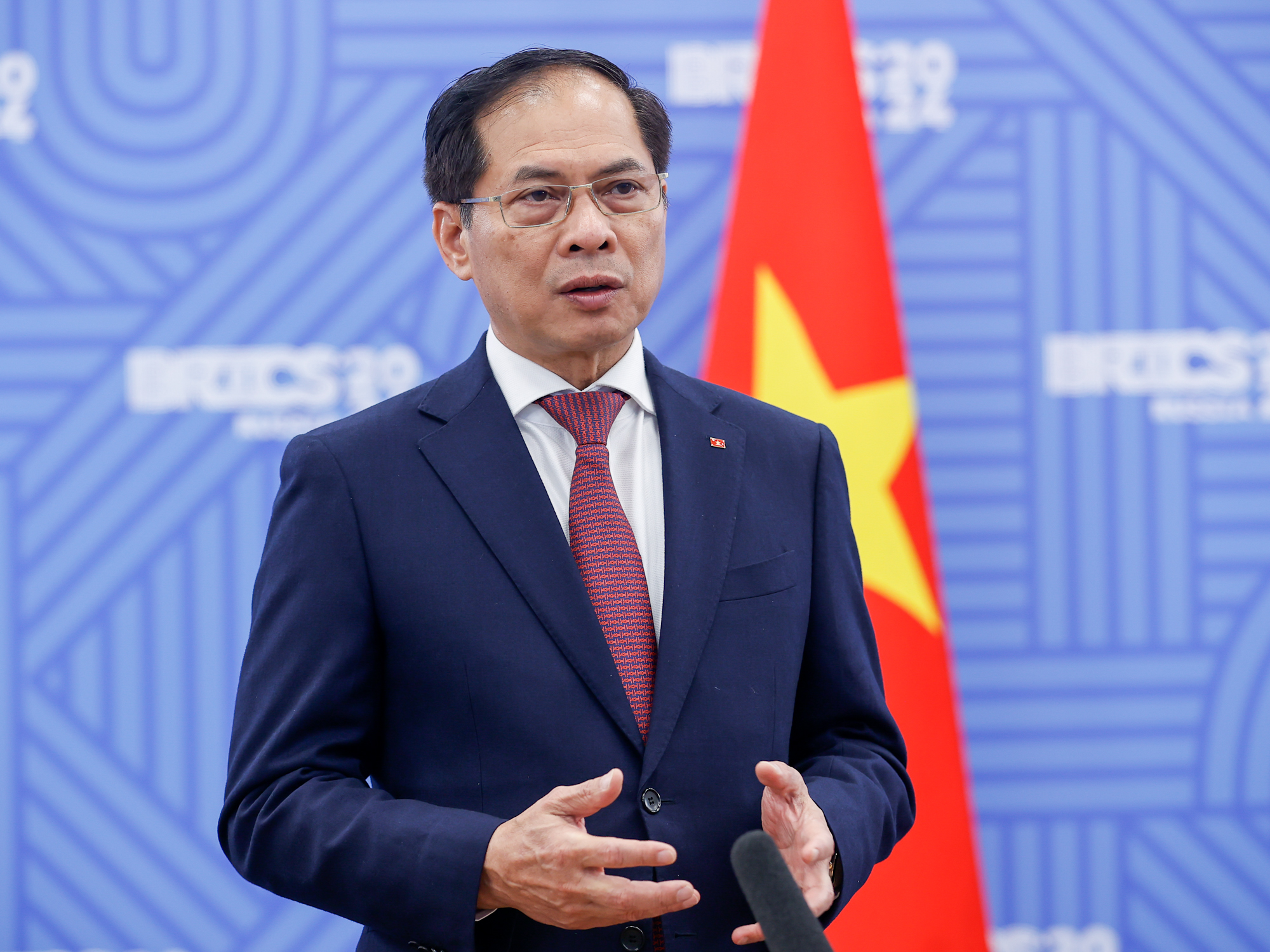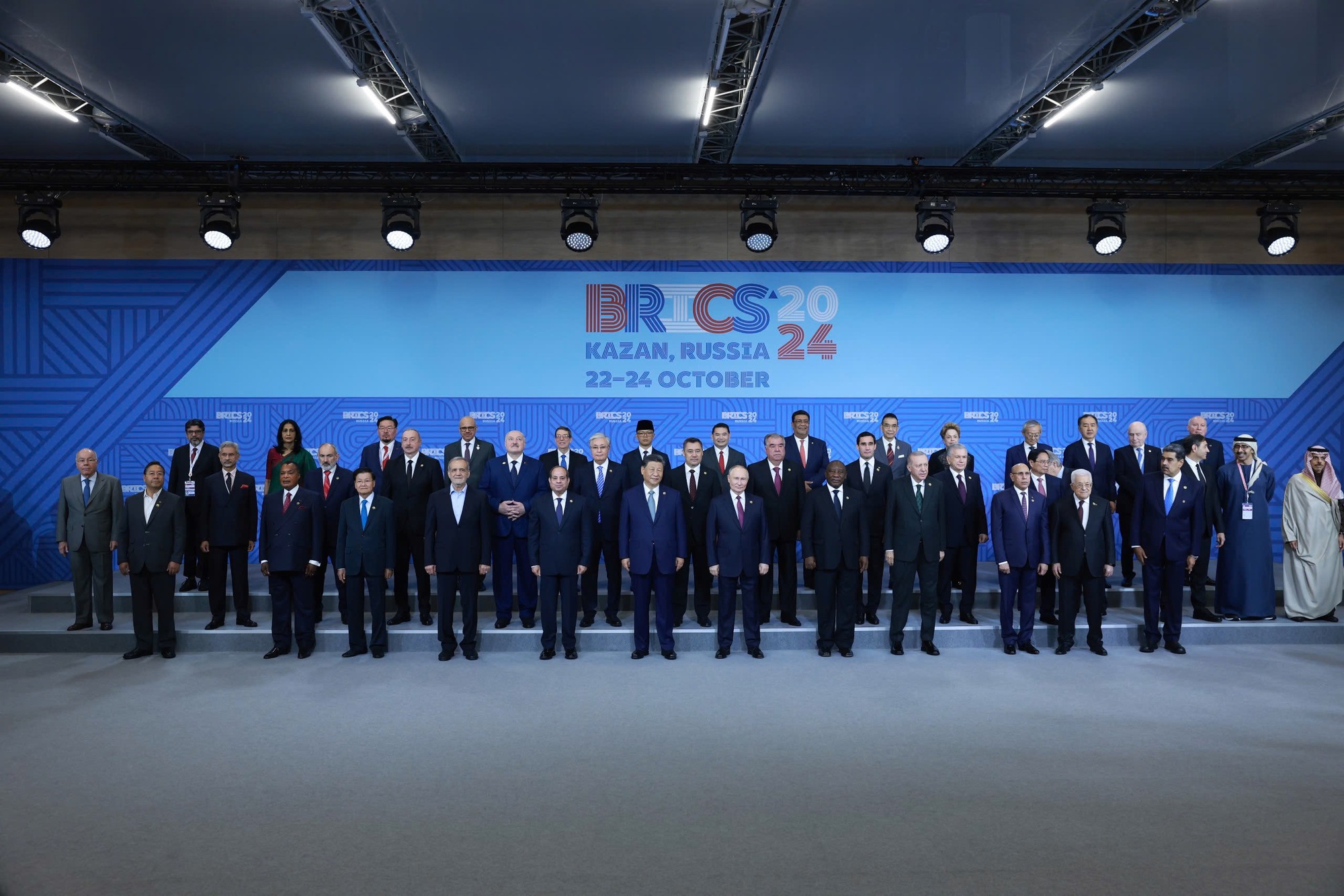FOREIGN RELATION NEWS

Prime Minister Pham Minh Chinh and the high-level Vietnamese delegation have successfully concluded their trip to attend the expanded BRICS Summit in Kazan, Russia.
Prime Minister Pham Minh Chinh and the high-level Vietnamese delegation have successfully concluded their trip to attend the expanded BRICS Summit in Kazan, Russia. Deputy Prime Minister and Minister of Foreign Affairs Bui Thanh Son speaks to the press on this occasion.

Deputy Prime Minister and Minister of Foreign Affairs Bui Thanh Son.
Could you share about the results of the trip made by Prime Minister Chinh and the high-level Vietnamese delegation to the BRICS Summit?
Prime Minister Chinh has recently concluded a successful trip to the 2024 BRICS Summit, themed "BRICS and the Global South: Building the Future of the World Together", at the invitation of Russian President Vladimir Putin, the 2024 BRICS Chairmanship. The summit welcomed over 40 leaders and representatives from BRICS member countries and invited guests, including developing nations in Southeast Asia, the Middle East, Africa, and Latin America.
This was a significant event for Vietnam to actively advance its consistent foreign policy of independence, self-reliance, multilateralization, and diversification in international relations, positioning ourselves as a friend, a reliable partner, and a responsible member of the international community while enhancing multilateral diplomacy.
First, the Prime Minister’s trip showcased Vietnam’s commitment to global efforts. Alongside proactive participation and positive contributions to ASEAN, the United Nations, APEC, G7, G20, and other multilateral frameworks, and demonstrated our active and responsible spirit within the international community. At the summit, the Prime Minister emphasized a comprehensive approach to global issues, highlighting principles of international relations and promoting multilateralism and global solidarity to foster peace, stability, and transform challenges into opportunities and new engines for growth.
Second, it underscored a spirit of cooperation. Recognizing a new era of connectivity, integration, smart technology, and innovation, as well as unprecedented challenges facing humanity, Prime Minister Chinh called for BRICS to promote "five strategic connections" involving resources, hard and soft infrastructure, global supply chains, people-to-people ties, and global governance reforms. Vietnam stands ready to collaborate with BRICS and the international community to achieve the noble goal of building a better world.
Third, it affirmed Vietnam’s stature on the world stage. The Prime Minister’s address conveyed strong messages about a resilient, self-reliant, and proud Vietnam that has made dynamic socio-economic developments. His speech affirmed Vietnam’s strategic mindset and contributions toward addressing global issues, which received high praise from leaders and delegates, marking a meaningful contribution to the summit’s success.

Group photo of state leaders participating in the BRICS Summit.
Could you elaborate on the outcomes of Prime Minister Chinh’s meetings with Russian leaders and interactions with other summit attendees?
During the summit, Prime Minister Chinh had nearly 30 bilateral engagements, including a high-level dialogue with Russian President Vladimir Putin, meetings with Russian Deputy Prime Minister Alexander Novak, and discussions with various ministers and major Russian corporations. These interactions aimed to deepen the Comprehensive Strategic Partnership between Vietnam and Russia, building toward the 75th anniversary of diplomatic relations in 2025.
First, Prime Minister Chinh and President Putin reaffirmed Vietnam and Russia’s long-standing, unshakeable friendship, strengthened by generations of leaders and citizens. This foundation continues to fuel the robust and sustainable growth of the Vietnam-Russia Comprehensive Strategic Partnership, contributing to peace, cooperation, and development in the region and the world.
Second, both leaders discussed expanding bilateral ties across multiple fields. In politics and diplomacy, they agreed to deepen mutual trust through high-level exchanges. In economics and trade, both sides endorsed a Vietnam-Russia Cooperation Plan until 2030, aiming to maximize the benefits of the Vietnam-Eurasian Economic Union Free Trade Agreement, facilitate bilateral trade, and advance projects in infrastructure and energy. Beyond traditional sectors, they agreed to enhance collaboration in science, technology, innovation, green transition, digital transformation, education, culture, and tourism.
Third, both sides were committed to close coordination and mutual support in international and regional forums, supporting a fair international order based on international laws and the UN Charter, promoting peaceful resolution of disputes, and respecting each other's sovereignty.
During meetings with Prime Minister Chinh, leaders of other countries and international organizations expressed highly valued Vietnam’s growth achievements and increasing global stature. They emphasized the desires to strengthen multifaceted relations with Vietnam.
Prime Minister Chinh and these leaders agreed to prioritize exchange of delegations at all levels and enhance cooperation in economy, trade, investment, national defense and security, education, science and technology, culture, and emerging areas like digital transformation, green economy, circular economy, and knowledge-based economy.
Moving forward, Vietnam’s ministries, sectors, and localities will actively work with international partners to review and implement agreements, resolve challenges, and explore new areas of cooperation aligned with mutual interests to contribute practically to national development goals in the new phase.
In only 30 hours, with over 25 consecutive activities, Prime Minister Chinh’s participation in the expanded BRICS Summit and engagements in Russia were successful in both multilateral and bilateral dimensions. The results of the summit and bilateral meetings reaffirmed Vietnam’s foreign policy direction, as established at the 13th National Party Congress that aims to solidify favorable diplomatic conditions, elevate the nation’s position, and mobilize international resources for national development.
Huy Anh